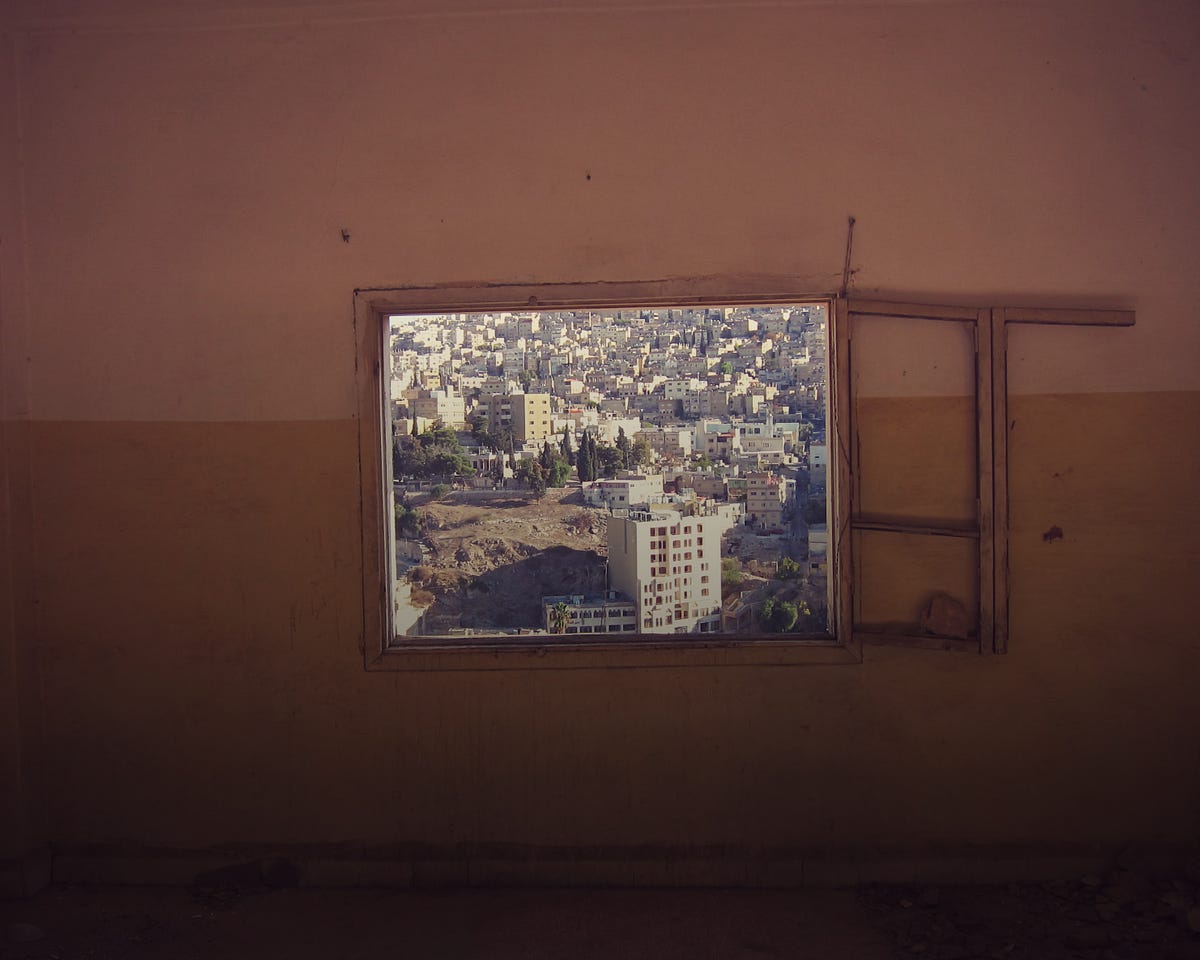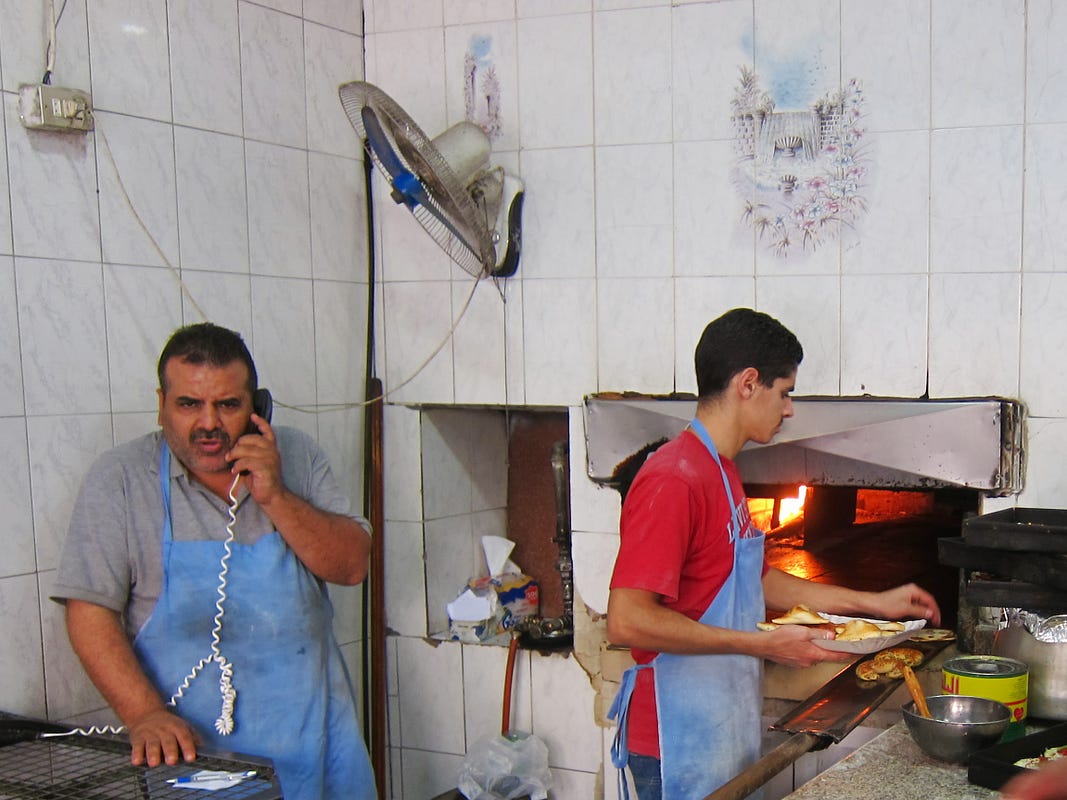The White Light of Amman

The taxi driver, Hassan, uses my garbled explanation of where I think I need to be to apply an educated guess. He drops me at the side of the road between a shop selling sewing machines and another yellowed manuscripts covered in barely decipherable characters. Some of these are not written in Arabic. They are brittle and much older.
I put my pack down and stand and look for a moment. The sea of people moves around me. Two tall, thin Jordanian police pick their way between potholes as flashing neon reflects off the spikes atop their helmets. They nod in unison as they pass, "Welcome, welcome."
I remember a dry typography lecture in a windowless hall on a cold winter's morning in Perth. The dividing branches of a PowerPoint diagram charting Amharic and Arabic, Sumerian and Cryllic like some family tree of long-extinct Pleiocene fish. Unfurling branches of young languages cut short as the bolded line marked "Latin" cuts across them and extends its unbroken arm to the present. No geopolitical context was offered for broken and conquered civilisations, just that these languages existed once but did not now. They had ended, but Latin had not, and nor had Arabic.
It is my first time in the Middle East and Hassan spent the majority of the 30 minute trip from the airport lecturing me on the dangers of driving in Amman. This is a first for me, a lecture on safe driving delivered by a taxi driver as he ducks and weaves between cargo trucks at a hundred kilometres an hour. But Hassan is a pro, and he beeps at the right times, flashes his lights at those going too slowly, and is suitably aggrieved when a slow moving ambulance has the temerity to pull out in front of him.
We make our way toward the city, from the flatness of the desert toward the heavily populated stepped hills and valleys of Amman. The highway emergency lane is punctuated by thrown together shacks offering coffee or towering piles of just-red pomegranates. I catch sight of a UNHCR tent and a cooking fire, a circle of camels, and a battered hilux, arranged at the cardinal points of a fenced construction site.
Hassan's basic premise is that drink driving is poorly policed, when at all, and on the nights of weekends, the roads swell with drunken drivers. This is a problem, Hassan says, because it messes with the predictability of the traffic. He swerves to avoid a Mercedes that has veered across three lanes of traffic to execute an illegal u-turn. Drunk drivers aren't predictable and this breaks the whole carefully orchestrated ballet of vehicular near-destruction.
A normal driver will give way to a truck, because the truck is larger, brakes more slowly, and will leave nasty patterns in your bonnet should it fail to stop. This allows taxi drivers to use said truck as a battering ram as it shoots through intersecting traffic. A drunk driver will not stop for the truck, or anything, and this leads to systemic uncertainty. "On Thursday, it is very bad. Very dangerous," Hassan says, as he runs a red light. "I can understand," I reply. I cannot understand.
I am sitting in the back seat of the taxi, the bulk of my pack beside me. Between vehicle safety tips, Hassan gestures at sights from the front seat. We round a corner and swoop past the towering Saudi embassy, still partially under construction, and a graffitied and shuttered restaurant, a huge wireframe globe resting on top. This is a faux pas for solo male taxi riders, sitting in the back, and is considered very rude. The back seat is for women, the front for men.
I am told this later, after I have left the manuscripts and the policemen and found the others. As we sit by the side of the road eating plates heaped with fried cheese, crunchy pistachios and sugar syrup, they explain to me the particulars of taxi seating etiquette and the complexity of gender roles in modern Jordan. The corruption towers, two unfinished high rises, and "the most visible artefact of the pervasive corruption here," accusatory steel fingers amongst a growing skyline.
Other things are pointed out. The story of a minister wandering into parliament and firing an AK-47 in response to a disagreement over a matter of law, the arrayed ministers gesticulating and yelling, rather than scattering. The number of abandoned buildings in central Amman, residents victim to the rapid increases in price over the past few years. The constant pressure of refugees in this country that already depends heavily on the whims of donors to the multilateral system.
As we stumble up the hill my head is full of newness. New concepts and perspectives to grapple with, and a new landscape to place them in. This is why I travel. It gives me a framework to rapidly assimilate new information and place it in context. And that context evolves and changes with more new information. More people, more places, more context.
That night I forget to shut the curtains. I wake as sunlight plays across the ceiling and bathes the houses terraced on the valley opposite in light. This is the kind of light which sharpens things, throwing them into relief against the obsidian shadows and angular buildings. It is the light of the desert and of clarity.
There is the brisk crackle of an amplified speaker and the first call to prayer sounds, pulling people out of the darkness and into the bright, white light. The day has begun.
When I got out of the taxi, Hassan smiled at me and said, "you will enjoy it here." He is right.

